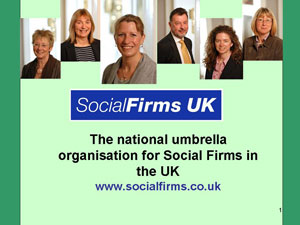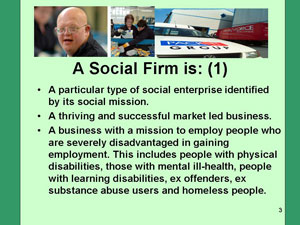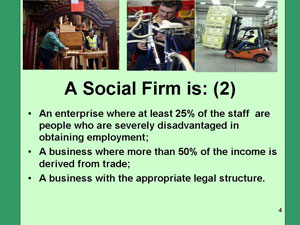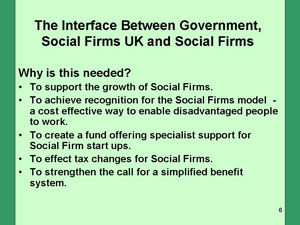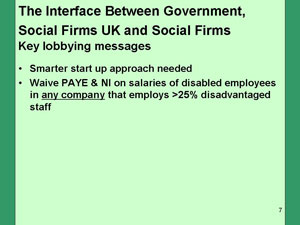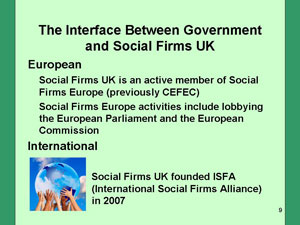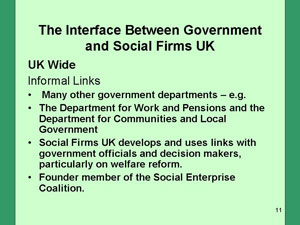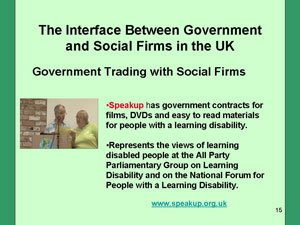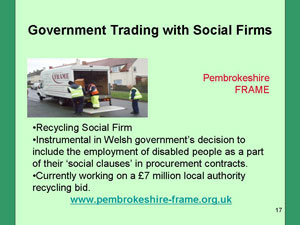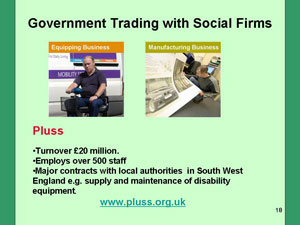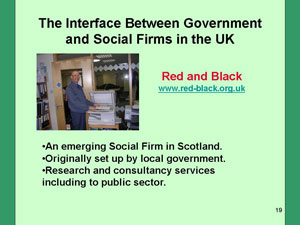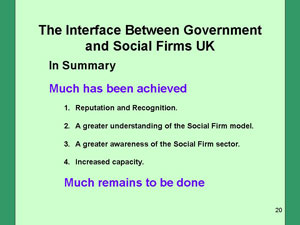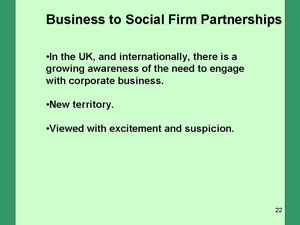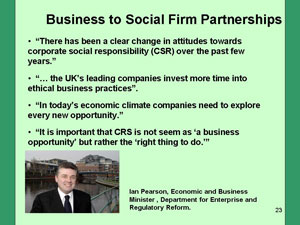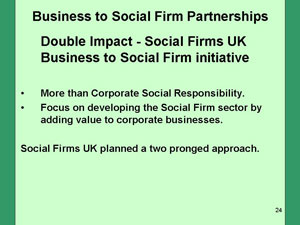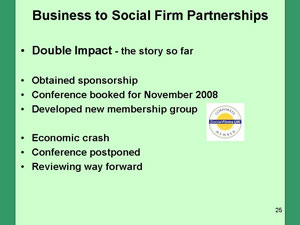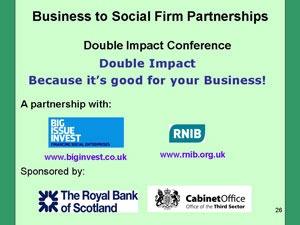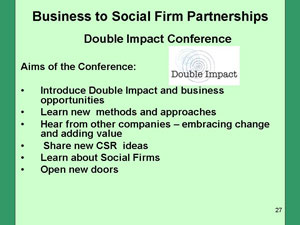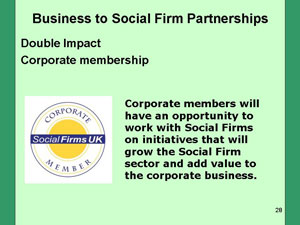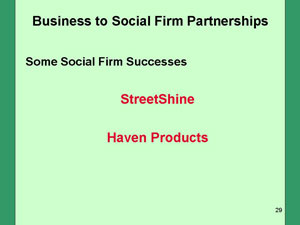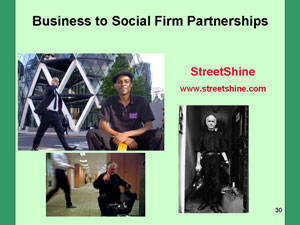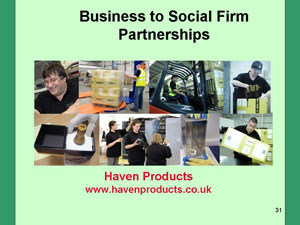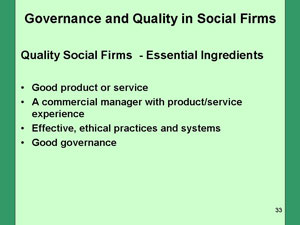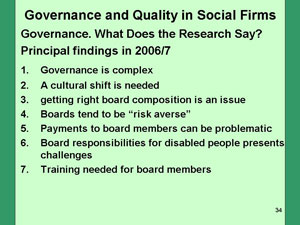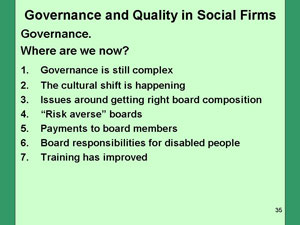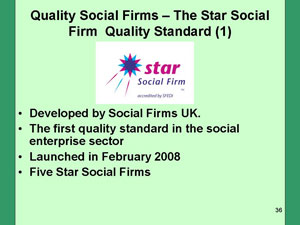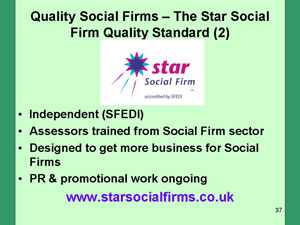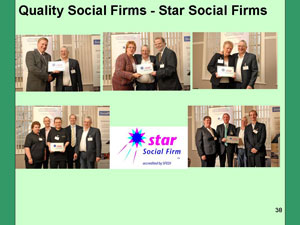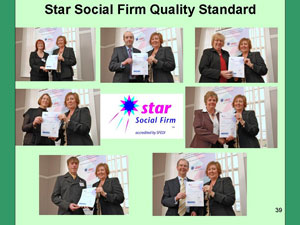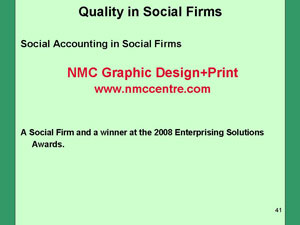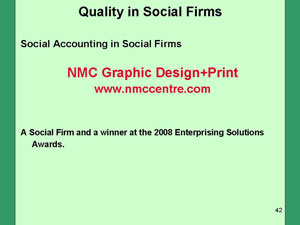Establishment and Partnership of Social Firms in UK
Ms. Kathy Baker
Quality Development Manager, Social Firms UK
Abstract
The presentation is in three parts:
- The interface between government and Social Firms in the UK;
- Business to Social Firm partnerships;
- Governance and developing quality Social Firms.
Social Firms UK is the umbrella organisation for Social Firms in the UK and in order to set the subjects to be discussed in context there will first be a short explanation of what is a Social Firm and will include a brief DVD on Social Firms
The Interface Between Government and Social Firms in the UK
Here the relationship with central and regional government between both Social Firms UK and Social Firms will be explained. The different levels of interaction with government and the range of ways in which that interaction takes place will be explained.
The actions of Social Firms UK, both strategic and operational, in relation to developing a positive relationship with government at all levels will be explored. Furthermore the issues around building a positive relationship with government, e.g. maintaining impartiality, capacity, and critical mass, will be examined.
In building the interface there have been some significant achievements, however, there are ongoing challenges.
In this section two short DVDs will be shown of Social Firms. Each has a different relationship with government.
Business to Social Firm Partnerships
This is an area that is very much in its infancy. It is one that arouses controversy but it is also thought by many to be crucial in building the critical mass of Social Firms. The recession and the new emphasis on ethical trade offers both opportunities and challenges; opportunities to grow; challenges in maintaining an ethical approach.
Many corporate organisations have well developed policies and practices on corporate social responsibility. This is based on a charitable approach. The challenge is to go beyond charity to embrace a social entrepreneurial, often as a part of the supply chain.
This presentation looks at where we are now, some Social Firm successes and our plans for developing a robust relationship between both corporate organisations, Social Firms UK and Social Firms.
Governance and Developing Quality Social Firms
Good governance is an essential part of running a good quality Social Firm. This section begins by looking at some of the governance issues with which Social Firms have wrestled and the recommendations for good governance.
In the last four years there has been a significant change in the quality of Social Firms as they get better at what they do; become more confident in walking the line between business and support.; and quality systems are developed. Some examples of ways in which quality is evaluated will be examined. There will be a short DVD on an award winning Social Firm that has introduced social accounting and is preparing its application to become a Star Social Firm.
Social Firms UK has developed the first ever quality standard for Social Firms. This section will give an overview of the standard and the ways in which Social Firms can be helped to become Star Social Firms. There will be a short DVD on an award winning Social Firm that has introduced social accounting and is preparing its application to become a Star Social Firm.
Good morning, ladies and gentlemen. Thank you very much for inviting me here today. I thought I would start by showing you the staff of Social Firms UK. Here they are. The person shown in the centre, is Sally Reynolds, our Chief Executive, who she sends her greetings to you today for a successful conference and indeed for a successful start to Social Firms Japan, which is a very exciting new initiative.
First of all, I’d just like to say how very welcome it was to hear Mr. Sumitani’s comments because they chimed so well with the thoughts that we have in the UK about Social Firms, from the development and indeed the current economic climate that we find ourselves in. So I’m sure that you’ll find a lot of what I say today will echo what you’ve already heard.
Three Aspects of the Social Firm Sector in the UK
I’m going to divide my time today into talking about three aspects of the Social Firms sector in the UK. First of all I will talk about the interface between government and Social Firms; then look at business to Social Firms partnerships and finally governance and developing quality in Social Firms: something that’s really very important indeed.
What I’d like to do is start by showing you a short film that we made about Social Firms. I think you’ll find from that that the Social Firm in Japan as described by Mr. Sumitani is very much the same as the vision that we have in the UK.
<Video>
Money, we’re told, makes the world go round. Business, commerce and profits shape the society we live in. But there are hundreds of companies in the UK that want to do more than just make cold, hard cash. Many of these companies trade for greater social good and still make money: they’re known as Social Firms.
But what exactly is a Social Firm?
A Social Firm is a commercial enterprise that employs disadvantaged people in the business.
Scotch Bonnet is a catering company that provides African and Caribbean food for corporate events. Scotch Bonnet has been trading now for about two-and-a half years and we have really been very successful.
As well as being a commercial business, it’s tailored towards supporting people with learning disabilities and mental health needs to work effectively within the kitchen.
Although it’s tough to run a social enterprise, the rewarding bit is seeing people develop the skills and to see them grow in confidence.
“This job makes you feel more confident. It gives you more confidence. And it also is a challenge, it shows you that you are independent and that you are capable, you can do it. But you’ve got to believe in yourself that you can do it.”
“Aquamacs is an aquarium company which installs and maintains aquariums around the country, in various places like Birmingham and Bradford. I’ve been working for them for about a year.”
“Aquamacs is a social firm which means 25% of the workforce has to be disadvantaged in the workplace. We employ deaf people and it gives them the chance to get a foot on the employment ladder. I really like working with Robin. I’ve never worked with anyone who’s deaf before and it’s kind of challenged my prejudices. Just because somebody’s deaf doesn’t mean he’s different from anybody else.”
“It’s a great job because you meet different people over time. It’s not like being indoors where you’re with the same people all the time. You see different faces, meet different people all the time. It’s very enjoyable. I’m doing fresh things all the time, meeting new people.”
So there you have it. Social Firms make profits like any other business, employ people who really struggle to obtain and hold down jobs, and best of all, make a real difference to people’s lives. Wouldn’t it be great if all businesses were like this?
And there are loads of us who’d like to work in a Social Firm. So we need more people to set them up.
[End video]
A Social Firm is: (1)
So I’m sure you would echo those sentiments: we do need more Social Firms and we need lots of social entrepreneurs to set up Social Firms.
On the screen in front of you now, you will see some more definitions of what is a Social Firm: a particular type of social mission; thriving market-led businesses, etc., etc.
A Social Firm is: (2)
And here we have a second screen. There are lots and lots of things about what a Social Firm is, but I don’t think we need to get too hung up about that. What we need to understand is the culture that underpins it. The three words that you saw on the screen in the film were enterprise, employment and empowerment, and I would actually add a further “e” because I think those go with the “ethical” employment, enterprise and empowerment. It’s those cultures that I know from talking to people here and elsewhere that are very much shared within the Social Firms sector.
The Interface Between Government, Social Firms UK and Social Firms
To move to the interface between government, Social Firms and Social Firms UK, this is the serious business of the day. You will see I have put on the screen Social Firms UK on one side and the government logo on the other. It could be said that this illustrates the divide between the two, and to some extent this is true. However, as you may imagine, we’ve been working very hard to develop the relationship with government and we are definitely making progress. With our system of government, ministers often change. Sometimes it feels the minute we’ve educated somebody, they move on to something else and we need to start all over again. Perhaps eventually we’ll have educated everyone and we’ll have a panacea for Social Firms. I’d like to think so.
The Interface Between Government, Social Firms UK and Social Firms
Why is this needed?
Why do we need an interface between Social Firms UK, and Social Firms and government? Well, of course we need it to support the growth of Social Firms. We need to have a dialogue with government. We need to get them on our side, and I’m sure that the same thing happens in Japan. I don’t think anything I talk about today will come as any a great surprise. The idea of talking here is really to tell you what we’re doing and help you, hopefully, to have some ideas and spark off some thoughts about the kinds of things that you want to do in Japan. I’m not saying that we get it right. Some of the time we do, but some of the time we don’t. We’re here to learn from you, as much as you learning from us.
In terms of supporting the growth of Social Firms, we need to explain to our government the role of the Social Firm and that it’s a cost-effective way of enabling people who are most disadvantaged in the labour market to work.
We have some difficulty with that because of our history. In the UK, we have supported factories, and Mr. Sumitani’s talked about those a little this morning, and supported factories cost the government a huge amount of money. It’s been worked out that for every person employed in a supported factory in the UK, it costs the government £32,000 per person per year. We don’t have that in Social Firms. There’s been research to show that actually it saves the government money, but we have to prove that, we have to put that message over to people. We have to prove that it’s an economic model, a cost-effective way of enabling disadvantaged people to work.
Another thing that we want to do is to persuade the government of the need to provide a fund for specialist support for Social Firm start-ups. We’re not asking for money for day-to-day running of Social Firms, but we do know that it is much harder to set up a Social Firm than it is to set up any other kind of business. We do feel the government should be supportive towards those start-up costs.
We also want to effect tax changes for Social Firms. Because of the way we operate in the UK, we think those tax changes should be something that are available to all people. So what we’re saying is that if a company, any company, employs more than 25% of its staff as severely disadvantaged people, there should be a tax break. That then means that the large corporate businesses, the Shells and the BPs of this world, if they suddenly decided to employ 25% of their staff as severely disadvantaged people, they would get the tax breaks and then nobody could point the finger at the Social Firm and say, “Well you’re having an unfair advantage over us.” That is because of the way business works in the UK that we really have to show that Social Firms are not having any kind of advantage over other kinds of businesses.
The other thing that we’re trying to do is to strengthen the call for a simplified benefit system. We have a very, very complicated system of benefits in the UK. If somebody is living in supported housing, they get housing benefit, and the minute they start to work more than 3½ hours a week, they lose their housing benefit. So trying to work more hours is really difficult and that’s one of the things that we really have to persuade the government to change before we can move forward in ensuring that people work more hours a week when they want to.
So how does the interface happen? Well, it happens partly as strategy. It happens on a number of different levels, European, UK-wide, regional and local, and in a range of ways, formal and informal, and on a variety of topics.
The Interface Between Government and Social Firms UK
European and International
Let’s have a look at the European scenario first. We’re a very active member of Social Firms Europe. Social Firms Europe activities include lobbying the European Parliament and the European Commission. Those parts of CEFEC that do that are really important in helping to bring a more cohesive approach to development of Social Firms.
On the international level, we recently formed the International Social Firms Alliance and I’m sure that Social Firms Japan will be part of that. I’d like to think so.
The Interface Between Government and Social Firms UK
UK Wide - Formal Links
In the UK, the formal link we have is a strategic partnership with the Office of the Third Sector. Now that’s a particular part of the government that has responsibility for the whole social enterprise sector, and we have a formal partnership with them. We’re working with them to contribute to the development and implementation of policy. We keep the Office of the Third Sector advised of publications. We invite them to seminars and conferences, and we are invited to their policy forums. We meet with ministers and officials as much as we can. It provides a route to government for Social Firms and much more.
Certainly, having a policy officer as part of the member of staff at Social Firms UK has made a huge difference to our development and our relationship with central government.
If you want to see the full extent of the partnership that we have with the Office of the Third Sector, you can see it on our Website.
The Interface Between Government and Social Firms UK
UK Wide - Informal Links
We have very many informal links with lots of other departments of government. And developing good relationships with government is a crucial part of what we do. There are people who influence ministers, who organize their diaries, and they are people who do most to help our cause. So relationships with these people, the civil servants, are really very important.
We have the Social Enterprise Coalition as the collective voice of social enterprise and Social Firms has a place at this table.
We also have the Department for Communities and Local Government and we’re seeking to increasingly engage with them and help them to understand the support that the social enterprise sector as a whole requires.
The Interface Between Government and Social Firms UK
The Regions & Local
Social Firms UK has a slightly complicated arrangement because the UK is divided into its different regions. So we have Social Firms Scotland and Social Firms Wales, who are sister-partners, as part of Social Firms UK.
On the local basis, decision making is increasingly pushed down from the national to local level. So you may imagine that with just six staff it’s not always easy to keep in touch with what’s happening with local government. There’s little opportunity for Social Firms and Social Firms UK to be part of local arrangements.
The Interface Between Government and Social Firms UK
Government Departments and Agencies
So, just briefly, we’ll see here a long list of the government departments and agencies that one way or another we’re trying to work with or do work with.
Organisations like the Office of the Third Sector, the one at the top, are extremely important, as is the Department for Work and Pensions. Others like the Health and Social Care Information Centre is much less so.
The Interface Between Government and Social Firms UK
Government Trading with Social Firms
I want to turn now to looking at the interface between government and Social Firms, as opposed to Social Firms UK. What you can see on the slide in front of you is five social firms: Speakup and Catering2Order, who have direct relationships with central government; Pembrokeshire Frame, that works very closely with regional government in Wales; and local government, Pluss, and Red and Black.
Speakup
I want to show you now a film, a very short DVD, about Speakup, which was established in 1988. It’s run by and for people with a learning disability and employs 20 staff. That’s actually 20 people, which is 13 fulltime-equivalent jobs.
[Video]
Welcome to Speakup Self Advocacy. My name’s David McCormack. Speakup is about change and making a difference for people with disabilities. There are lots of ways we do this.
All of the people you will see in this film are either employed full-time on a proper wage or through microprojects in a supportive work environment, because they are on benefits as well.
We are one of the largest employers of people with learning disabilities in the country. We provide training, work experience and a real chance for people to get the skills they need to work. And because we are a member of the National Open College network, we can provide recognized courses. At Speakup people can learn all kinds of important skills, like leadership, office skills.
“I work at Speakup Self Advocacy. I go to Speakup meetings and I’m also good at the computer. I’m doing a consultation on the computer.”
People can learn job readiness, citizenship, using computers, advocacy, speaking and presenting skills, and much, much more.
Speakup is a charity and a Social Firm. This means we’re really like a business. People here own the work we do and everyone is treated equally. People get a chance to work on lots of different things.
We run a spacious hi-tech and accessible meeting room, which can be hired out to anybody.
Alison is very involved in developing person-centred planning in Rotherham. She’s also paid a fulltime wage and...
[End video]
Just a short clip on Speakup. The importance of showing you that is that this is actually a Social Firm that has direct contracts with central government to produce information in easy-to-read formats and to provide DVDs and films about learning disability, so that these can be provided to people who need to know more about learning disability and to organisations that are employing people with a learning disability.
Catering2Order & Newco Products
Now I’d just like to show you another very short clip about Catering2Order. But before you see Catering2Order, you’re going to see a very short clip of an organisation called Newco. I just want you to look at it and I will explain afterwards why I want you to see it.
[Video-Newco]
“That was how Newco in the London Borough of Newham started out: making brushes in their supported workshop for servicemen who had lost their sight in the First World War. Now its modern factories employ 90 people, half of them registered disabled. And Newco, which now makes windows and kitchen for Newham’s council houses, operates commercially. But Newco is still part of the local council. It wants to be independent to adopt a new form of social enterprise...”
[End video]
While we’re moving on, I just want to explain that Newco used to be what you would call a supported factory, but it took a decision that it really wanted to become a commercial enterprise and it’s moved on hugely. Although it’s still part of a London borough (it’s belong to the local authority), it works in a completely commercial way and actually makes a profit. The profits are able to be ploughed back into growing the business. So that’s an example of a Social Firm that has a very close relationship with government, local government, because it’s actually owned by it at the moment.
So we’re going to see a short clip now on Catering2Order.
[Video]
For a catering firm, too, support from Action for Blind People has been vital. John Charles’ company, Catering2Order, runs the canteen at Action’s offices. And it’s planning to expand to provide make-to-order sandwiches for workers in the City of London. John Charles had wanted to set up his own company eight years’ ago but couldn’t get anyone to back him.”
“When I graduated from university, I actually had an idea for this business and going around to different banks as you do to get a business loan to start up, the biggest barrier that I came across was quite often I’d be told, ‘Oh, but you’re blind. You won’t be able to cope in a commercial kitchen. Can you take on so much responsibility with your vision?’ And the vision was always seen as a disability and so too much of a risk for the banks.”
After rejection by the banks, John Charles spent most of eight years on the dole, until Visage provided the support he needed...
[End video]
That video was actually made three years’ ago and John Charles is absolutely the epitome of the kind of social entrepreneur that we really need to find and encourage to develop Social Firms. You will see on the slide that’s in front of you now that Catering2Order now employs 15 people and I think it’s absolutely brilliant that he’s gone on in open competition to win the contract to feed the builders of the London Olympic stadium. I met with John recently and whilst I was with him a phone call came through to say that he’d been shortlisted for a contract with another local authority for a £2 million contract. This is for his outside catering business. So in three years, he’s grown hugely, and it’s very much down to him and his passion and his absolute determination to make a success of his business, his Social Firm.
Pembrokeshire Frame
I mentioned Pembrokeshire Frame. This is a recycling firm and they have been instrumental in the Welsh government’s decision to include the employment of disabled people as part of their “social clauses” in procurement contracts. This means the government says, “We have these contracts that we need to put out to organisations and you must meet the social clause that’s in this contract before we will consider you having this work.” So, in Wales, if you want a contract now, part of the social clause is that you have to employ disabled people in the work that you want to do for the Welsh government. As you can see on the screen, they’re working on a £7 million local authority recycling bid.
Pluss
Pluss is the largest of the Social Firms in the UK. Interestingly this, again, was once a local authority business and a sheltered workshop and has changed hugely. It employs, as it says on the screen, over 500 staff and has a turnover of more than £20 million. It’s very, very unusual as a Social Firm in that respect. None of the other Social Firms in the UK come anywhere near this, but it is an incredibly successful business, one that we feel has lots to offer the Social Firm sector in terms of the expertise that they’ve built up in the last few years.
Red and Black
And finally, Red and Black. Red and Black is an emerging Social Firm in Scotland. I haven’t mentioned emerging Social Firms. An emerging Social Firm in the UK is one that is trying to get through the door of meeting all those things about 25% of the staff having a severe disadvantage and 50% of the income from trade. So Red and Black haven’t quite got there yet, but interestingly they were set up by a local authority. They’re now a stand-alone business doing research and consultancy, including to the public sector.
In Summary
So, in summary, much has been achieved. We have a reputation as an organisation that delivers and we have a much greater recognition of Social Firms. It opens the door to identifying opportunities to promote the interests of Social Firms and the Social Firms sector. It takes a lot of time, but it’s well worth it. It’s useful for us that the government now calls upon us frequently and it has a greater understanding of the Social Firm model. It’s a slow and ongoing process, but it’s an essential prerequisite to the more tangible outcomes that we seek. Having a greater awareness of the Social Firms sector so that its needs are more likely to be taken into account, for example, in subcontracting, is very important and we have certainly made steps in that direction.
Our contract with the Office of the Third Sector is one that goes up to 2011 and it has increased this capacity to develop initiatives for members. For example, we are setting up a visit programme whereby people interested in starting Social Firms or already running Social Firms but needing more expertise can go and get it directly from Social Firms.
So much remains to be done and I’m sure we’ll be learning from Social Firms Japan before we go much further.
The Interface Between Government and Social Firms UK
In England, we often talk about things being an uphill struggle. And it’s true that this is often so when it comes to winning the hearts and minds of government. You may decide that this picture is even more relevant to the next section of my presentation today...
Business to Social Firms Partnerships
In this section I want to talk about Business to Social Firms partnerships. This is something that is very much the flavour of, not just the month, the year. There’s a growing awareness of the need to engage with corporate business. It’s new territory. It’s viewed with excitement and with suspicion. There are some people who don’t like it at all.
Ian Pearson, who’s the Economic and Business Minister, has made a number of statements about business to Social Firms partnership. He is suggesting there’s a clear change in attitude towards corporate social responsibility and that leading companies need to invest more time into ethical business practices. I’m sure we would agree. But in today’s economic climate we need to explore every new opportunity and that corporate social responsibility is seen as the right thing to do and not as a business opportunity.
Double Impact
When I first was asked to come to Tokyo for this presentation, we were about to launch a conference called Double Impact, a business to Social Firm initiative, more than corporate social responsibility, a focus on developing the Social Firms sector by adding value to corporate business. We had a two-pronged approach. This is what we planned and it didn’t quite happen like this. So what did happen?
Double Impact - the story so far
We had a conference planned for November 2008 and we developed a new membership group called Corporate Members. Well, you may remember we had an economic crash and we had to postpone our conference. Nobody, but nobody, was interested. the conference was planned for the 11th November - just two weeks after all the banks around the world were crashing, left, right and centre. I don’t think we got our timing right. So we’re reviewing the way forward.
Double Impact Conference
Our conference was meant to be Double Impact because it’s good for your business. It was a partnership with the Big Issue, the Royal National Institute for the Blind, the Royal Bank of Scotland and the Cabinet Office.
Aims of the Conference
The aims of the conference were to help learn new methods and approaches and to hear from other companies wanting to embrace change and add value, share corporate social responsibility ideas and to open new doors.
The theme was moving forward and making your money and time go further. The idea was to work with corporate businesses to encourage Social Firms as part of the supply chain, “buddying” a Social Firm or even starting a Social Firm. So, for example, a large organisation such as Shell, shall we say, would contract out their catering business to a Social Firm. It all sounds lovely, but it hasn’t happened yet and we’re watching the situation carefully with a view to running a conference later this year.
Double Impact Corporate membership
We have launched our corporate membership scheme. The idea is for corporate members to have an opportunity to work with Social Firms and to work on initiatives that will help the Social Firms sector to grow and add value to the corporate business sector.
StreetShine
We have some successes and I just want to mention two of those. StreetShine and Haven Products. If you come to London, you may find StreetShine. It’s an innovative business offering a shoeshine service within offices in London. It has over 40 contracts with large organisations such as KPMG, Reuters, Ernst and Young, and Barclays Global Investment. It has a permanent shoeshine stand at the Grosvenor Hotel besides Victoria train station and the Ted Baker store in Cheapside. So if you come to London, you can have your shoes shined by StreetShine. This is very much part of an initiative where a Social Firm based on the employment of homeless people has gone into partnership with large corporate businesses.
It’s experienced a 20% increase in turnover in October in the Canary Wharf and the Square Mile. The news was featured in the [7th] November Daily Telegraph as “Shoe shiners defy the credit crunch” because everybody’s wanting to have smart shoes when they go for their new jobs.
Haven Products
The other organisation I want to talk about is Haven Products. This is a large Social Firm in Scotland. It offers products and solutions to people wanting to outsource their production processes. These range from packaging and fulfilment, to print finishing. They have a proven track record in delivering on the most challenging of requirements. If you drink whisky (and I think you do in Japan) you may well find that it’s actually been packed by Haven Products. They have a very close relationship with the Edrington group that own a large section of the whiskey industry in Scotland. Haven Products have a group of staff who can be outsourced to other organisations; for example, John Dewar’s, they’re from Scotland, and two other large organisations. So this group of staff, when those organisations are short-staffed, will go in as temporary staff. They are very much part of Haven but they’re a kind of movable feast: they will go in and troubleshoot into another organisation when it’s needed.
Are you an ethical shopper?
So, are you an ethical shopper? Do you work with a corporate organisation? Do you buy from Social Firms? StreetShine is in the lead in building business to Social Firm partnerships. We’re at an early stage but the scene is set. People want to trade ethically and corporate organisations are beginning to recognise the value of ethical business partnerships. We think Social Firms UK is at the forefront of this movement and we believe in the next two years there will be very significant advances. This slide leads me very nicely onto the final part of my presentation today: governance and quality in Social Firms, where we will look at what makes a quality Social Firm.
Governance and Quality in Social Firms
Quality Social Firms - Essential ingredients
There are some essential ingredients to a Social Firm. First, of course, you have to have a good product or service. You can’t sell something that people don’t want. Secondly, you need a commercial manager with product or service experience. Five years ago in the UK, it was not unusual to find a Social Firm being run by a social care person, somebody who had been working in the health service or in the social services in a care service. Now, today, that’s uncommon. The Social Firms are run by qualified managers who have experience in their products or the services.
To be a quality business, you have to have effective ethical practices and systems. Over the last four years, we’ve really made huge changes in that. In order to be really effective in the workplace and to get the business, we need to make sure we are the best we can possibly be.
And finally, we need good governance. That is to say, the people at the top, the directors, they need to be the right kind of people and we’re going to have a look at that now.
Governance. What does the research say?
We did some research into governance. The principle finding was that governance is very complex, that it’s manageable, but getting the organisational structure is not easy. And we’ve certainly found that that has changed. Governance used to be a lot of people from health and social services, and now there’s much more of a balance between the needs of the business and the social care that’s needed, the social responsibility within the business.
In governance, we found that there was a need for a cultural shift and by that I mean that boards tend to be “risk averse” as you can see down here [on the slide]. So getting the board composition was an issue because we have a situation where nobody wanted to change. For example, in the UK, you could say that our prime minister has to send for a traffic report before he crosses the road; he’s risk averse, and so were the boards of Social Firms. We have to have people who are able to take risks. They have to be calculated risks and they have to be logical risks, not like the Iceland banks.
They found that payments to board members can be problematical. This is something that we’ve been looking at because there was a thought that you shouldn’t pay boards, but if you have people on your board with expertise that can help your business, it can make sense to pay them.
Board responsibilities for disabled people present real challenges and that’s something that we are still wrestling with and training is needed for board members.
Governance. Where are we now?
Well, governance is still complex. Life and new challenges will ensure that it stays that way. Real evidence is that governance is now much more competent. The cultural shift is definitely happening. Charities have woken up to business methods, and the messages and training that has taken place are bearing fruit. No longer do contracts run at a loss, and being at least solvent is now seen as essential. Finding the right board members is not easy, but people are waking up to the fact that they need to advertise for board members. They’re becoming more businesslike in their approach to getting the skills that they need on board. But there is still a skills shortage.
Payments to board members has become less contentious. And there are challenges to be addressed in supporting people with disabilities on the board. As I say, more work needs to be done, but training has definitely improved.
Quality Social Firms-The Star Social Firm Quality Standard (1)
So, quality Social Firms: Social Firms UK developed the Star Social Firm Quality Standard. It’s the first quality standard in the whole of the social enterprise sector and we launched it just under a year ago. It says here, “Five Star Social Firms”. I need to clarify that. What that means is that within the UK, there are five Social Firms that have achieved Star Social Firm status. The idea of a Social Firm that has achieved the star standard is that it’s a leading-edge, genuine Social Firm; that it’s sustainable, professional, a quality-driven business with a sound commercial focus. It’s a business where people can purchase with confidence; a business that can help others achieve their own corporate social responsibility targets.
Quality Social Firms-The Star Social Firm Quality Standard (2)
It was independently assessed and the assessors were trained from the Social Firms sector. It was designed to get more business for Social Firms and the PR and promotional work for it is ongoing.
Quality Social Firms-Star Social Firms
These are photographs of some of the Social Firms receiving their accreditation last year, just the five of them. Three of them, Pembrokeshire Frame, Haven Products and Pluss are Social Firms that I have mentioned here today.
Quality Social Firms-The Star Social Firm Criteria
Slide 40(Text data)
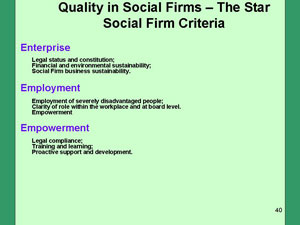
An enlarged picture
So, what is it about? Well, it comes under the three values ? enterprise, employment and empowerment. Star Social Firms must have right legal status and constitution, and be sustainable, both environmentally and financially. And it must be sustainable as a Social Firm; in other words, it must achieve the right balance between social care and business. Obviously, it’s about employment of severely disadvantaged people, and clarity of the role within the workplace and at board level. The empowerment is about making sure that people go beyond legal compliance in their employment, also in their training and learning. And that training and learning goes alongside proactive support and development.
We have a whole Website devoted to the Star Social Firm, which you can look at if you’re interested.
Social Accounting in Social Firms
Another aspect of quality is social accounting in Social Firms. I want to show you a very short video of NMC Graphic Design and Print, who were a winner last year at the 2008 Enterprising Solutions Award.
<Video on NMC Graphic Design + Print> (not transcribed)
So, as you saw in that video there, Graphic Design + Print makes over £100,000 profit a year, which it’s able to give back to the main centre, and people are able to have their physiotherapy and all kinds of other support that they can’t get from the NHS. It’s just a really good example of a Social Firm that makes money and is able to put that money back into developing not just itself but the larger organisation. But because it’s able to make money, it’s able to undertake social accounting; that is, looking at other kinds of things that are important within a Social Firm. So, for example, quality of... they undertook a social accounting.
This is just a couple of slides from it to show the kinds of questions that they asked. So, they asked the staff to rate the organisation in terms of a caring organisation which respects the individual and has an open management style. As you can see, a significant number of the staff agreed completely.
Slide 43(Text data)
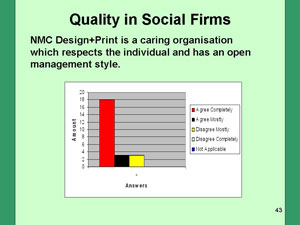
An enlarged picture
And then another question was that this is an organisation that creates and maintains an environment where disability is no barrier to achievement. And again, the vast majority of people agreed completely with that. This was all done confidentially so there was no question of people being coerced to say the right thing.
Slide 44(Text data)
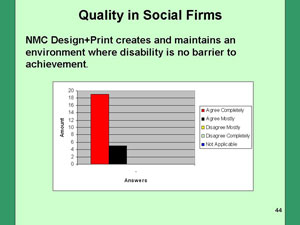
An enlarged picture
Here’s a couple of others: “I am shown respect and dignity by my boss” and “I feel my personal development is taken seriously.”
Now, as I say, social accounting is time-consuming and it’s expensive, but it provides answers to the questions that we need to have to build a body of evidence about Social Firms and their value. We need this to convince government and others that Social Firms really are the way forward.
The Government, Social Firms and Quality
Slide 45(Text data)
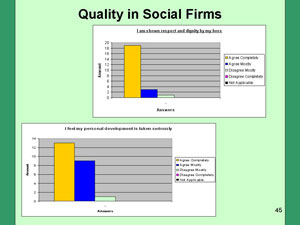
An enlarged picture
Working with the government and Social Firms, improving governance and quality, are all part of our work at Social Firms UK to grow and develop the Social Firms sector. For the future, there’s much more to do and we’re just beginning a programme to introduce quality standards for customer care in Social Firms, plus we’re undertaking a benchmarking project and starting a Social Firm visit programme, as I’ve already mentioned.
Slide 46(Text data)

An enlarged picture
The world has changed. Mr. Sumitani mentioned Barack Obama and he is clearly very committed to social change. He got his hands dirty in social enterprise. I believe that with people like him, and all of us, and the views that are being expressed, we are at a moment in history where we can change and where enterprise can become ethical and we can move forward for successful ventures. Mr. Kamoshita said we should not be pessimistic and we should look up to the skies, and I very much agree. I’d just like to finish by saying it’s been a pleasure to be with you today and I wish you every success. Thank you very much.

